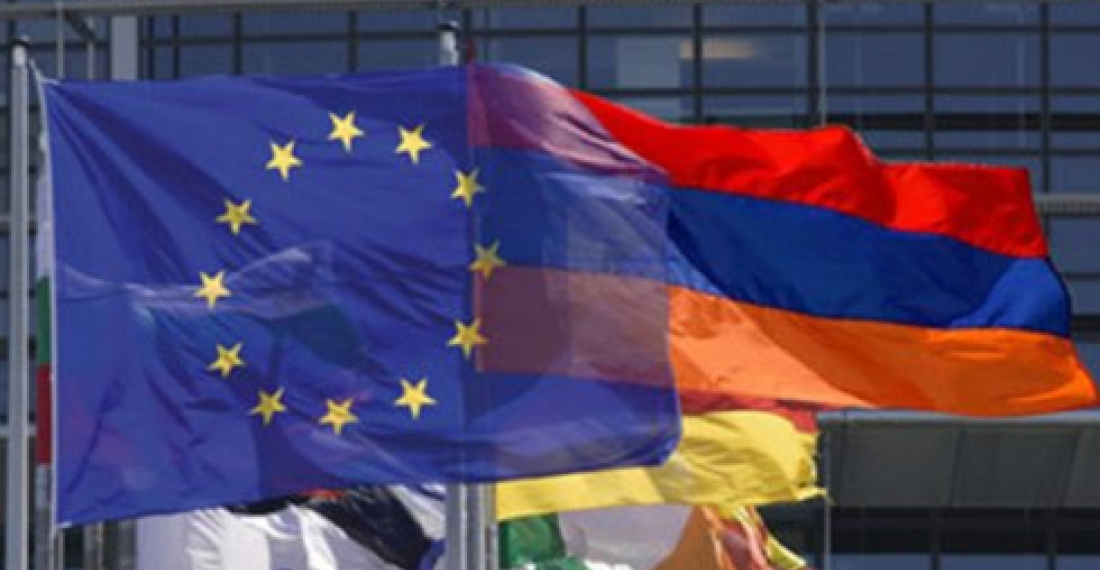This commentary was prepared by the editorial team of Caucasus Concise, a weekly electronic newsletter published in association with commonspace.eu
The European Union's top diplomat in Armenia, Ambassador Piotr Switalski, on Tuesday ( 24 January) gave a very upbeat assessment of the current state of EU-Armenia relations when addressing a new year press conference at Yerevan's media centre.
Switalski said that 2016 was a busy, but successful year for EU-Armenia relations. "We expect the momentum in the relations to be maintained and taken to a new level in 2017 as we bring the new framework agreement [between the EU and Armenia], to a successful conclusion", he said.
Switalski added that "the discussions on the new framework agreement are very advanced, and the negotiators are very close to the conclusion of the agreement, and if everything goes well the finalisation of the negotiations will be a major event in 2017". The EU diplomat said that there are still some open issues, "but we have no reason to believe that they cannot be overcome". He added that from its side the EU sees "a sincere effort and a constructive approach". He highlighted what he called the new circumstances that emerged after 2013 among these still open issues.
The "circumstances of 2013" that Switalski referred to are related to Armenia's sudden, eleventh hour decision, not to sign an Association Agreement with the EU as it had planned to, but instead to join the Russia led Eurasian Economic Union.
Ambassador Switalski's optimism echo the views of other EU officials, speaking in Brussels before Christmas. Read more here.
The progress in the negotiations is to be welcomed. Many Armenians are concerned about their country's over-dependence on Russia in both the security and the economic spheres. Relations with the European Union are seen as a sort of counter-balance. But the EU is also a tangible source of assistance for Armenia, at a time when the country is facing serious economic challenges. In this week's press conference Ambassador Switalski said that in 2016 the European Union transferred 62 million euros in development assistance to Armenia, and signed contracts for a further 50 million euros. He outlined five immediate priorities for the EU in its dealings with Armenia: (a) a successful implementation of the Election project, leading to good elections in April; (b) improving the business climate; (c) co-operation in the fight against corruption; (d) implementation of the human rights support contract which has clear commitments; (e) strengthening the independence of the judiciary based on the fact that the EU has already allocated 50 million euros for judicial reform, and put considerable effort in this sector.
Apart from the contractual agreement the two sides are also finalising two other agreements: the first will define the partnership priorities of the two sides, and enshrine them into a politically binding document; the second document will outline the development priorities that the two sides identify for working together until 2020.
The speed with which the negotiations have been conducted, and the success achieved so far is commendable. This is partly due to the commitment shown by Armenian officials on the negotiations team. Brussels has also worked with unusual speed. All this is very commendable.
But there are still at least three hurdles ahead:
First, Armenia will conduct important parliamentary elections in April, and problems with the elections can derail the framework agreement negotiations. The European Union is supporting the election process, including with a grant of 7 million euros for the organisation of the election process. Ambassador Switalski said that "Good, fair, just and transparent elections will help boost relations, open new possibilities of co-operation and create a good climate for the future". He added, "the European Union has invested a lot - both in terms of money as well as political support so we have a deep and clear interest in the success of the elections". However Ambassador Switalski emphasised that the EU was interested in the clean nature of the election process, not the particular issues or personalities. He said that there were two areas of particular importance - the prevention of political corruption [vote-buying], and the use of administrative resources. He said that there was already a good legal framework but these now had to work in practice. "I am looking forward to the good conduct of the elections".
Second, Armenia and the European Union will have to agree some kind of language acceptable for both sides in reference to the Karabakh conflict in the preamble to the new agreement. The position of the two sides is different, and there is little chance that the differences can be narrowed in time. There will therefore be a need for constructive ambiguity.
Third and last, but not least, the Armenian authorities will have to show more political will in 2017 than they showed in 2013. Those who torpedoed the EU-Armenia Association Agreement in September 2013, will not be happy with the new agreement either, and we expect that there will be attempts to delay or defer the process. It will be up to the Armenian authorities to show resilience.
But there is also one other aspect that should not be ignored. Regardless of the value and substance of the current negotiations, the new arrangements fall far short of the arrangements envisaged under the original Association Agreement. It is the duty of European Union officials to make this clear to the Armenian public, spelling details if necessary. Not to do so will be a serious omission.
This commentary was prepared by the editorial team of Caucasus Concise, a weekly electronic newsletter published in association with commonspace.eu







